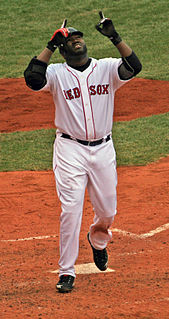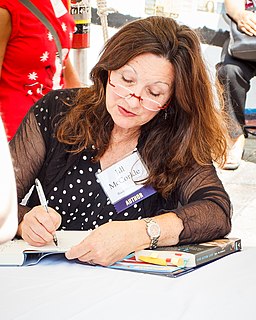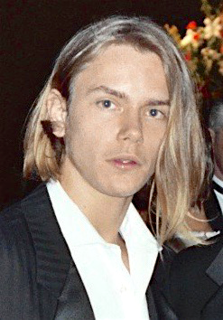A Quote by Gurinder Chadha
When you have a baby you start thinking of death cuz' you see the opposite of life. I've calmed down now but for the first or two years, I kept thinking: "Oh my God, if I die what's going to happen to the child?" And you realise how vulnerable they are, but how critical your own life is because they're so dependent on you. You do feel your own mortality. I kept saying to myself: "OK, when they're 18, I'll be 'x'; so if they get married at 30, I'll be'x'will I get to see grandchildren?" So, since they've been born I've been thinking about death the whole time.
Quote Topics
About
Baby
Because
Been
Born
Child
Critical
Cuz
Death
Dependent
Die
Down
Feel
First
Get
Get Married
God
Going
Grandchildren
Happen
How
Kept
Life
Life Is
Married
Mortality
Myself
Now
Oh
Oh My God
OK
Opposite
Own
Realise
Saying
See
Since
Start
Thinking
Time
Two
Two Years
Vulnerable
Whole
Will
Years
Your
Related Quotes
It's saying no. That's your first hint that something's alive. It says no. That's how you know a baby is starting to turn into a person. They run around saying no all day, throwing their aliveness at everything to see what it'll stick to. You can't say no if you don't have desires and opinions and wants of your own. You wouldn't even want to. No is the heart of thinking.
We must face the No. 1 critical issue of our day. It is youth crime in general and black-on-black crime in particular. There is nothing more painful to me at this stage in my life than to walk down the street and hear footsteps and start thinking about robbery. Then look around and see somebody white and feel relieved. After all we have been through, just to think we can't walk down our own streets, how humiliating.
I feel prematurely old. I'm actually having this major belated quarter-life crisis. I'm turning 30 in a couple of weeks. I've been thinking a lot about mortality. A lot about what I'm going to do with my life and how to enjoy it. One of the things I'm going to work on is being more spontaneous, letting go, embracing the beauty of come-what-may.
Someday, in the moment of death, your whole life will pass before you. In a few fractions of a second-because time no longer applies-you will see many incidents from your life in order to learn. You will review your life with two questions in your consciousness: Could I have shown a little more courage in these moments? Could I have shown a little more love? You will see where you let fear stop you from expressing who you are, how you feel, or what you need. You will see whether you were able to expand into these moments, just a little, to show love, or whether you contracted.
There's nothing to mourn about death any more than there is to mourn about the growing of a flower. What is terrible is not death but the lives people live or don't live up until their death. They don't honor their own lives ... their minds are full of cotton. They swallow God without thinking, they swallow country without thinking. Soon they forget how to think, they let others think for them.... Most people's deaths are a sham. There's nothing left to die.
I have a hunger for justice, but art is a place I've always enjoyed being able to be free - to live in worlds that you don't have to be thinking about that all the time. I don't see myself writing Upton Sinclair books. My books are to entertain, although to me, entertainment is to make you feel sadness or to get in touch with your own pain - or fear, or to remember somebody who has gone missing from your life. That's my calling.
We are left with nothing but death, the irreducible fact of our own mortality. Death after a long illness we can accept with resignation. Even accidental death we can ascribe to fate. But for a man to die of no apparent cause, for a man to die simply because he is a man, brings us so close to the invisible boundary between life and death that we no longer know which side we are on. Life becomes death, and it is as if this death has owned this life all along. Death without warning. Which is to say: life stops. And it can stop at any moment.
I don't want to get so lost in thinking about me and talking about me all the time in interviews. It's so nice to unwind and just look at other things and get out of yourself. It's hard to detach myself from myself without neglecting myself. You know what I mean? I don't want to get in to the habit of thinking about my career because when it comes down to it, it's not really that important. I could die tomorrow and the world would go on.






































